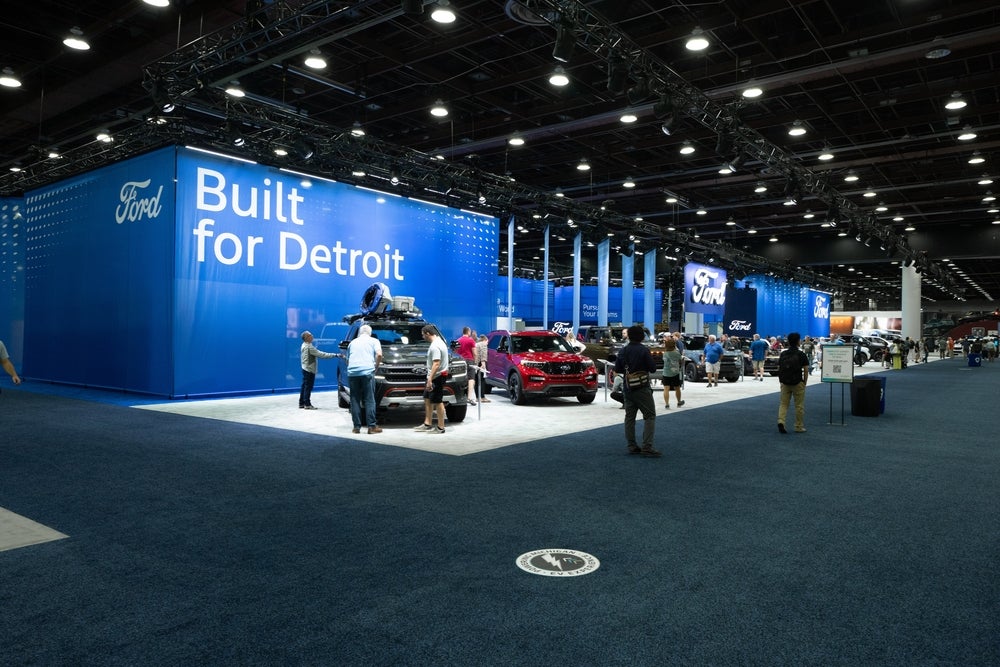In September, the North American International Auto Show (NAIAS) took place in Detroit, but most of those in attendance on the preview days appeared to agree that the show was underwhelming compared to its pre-pandemic heyday. In fact, some could be heard wondering aloud – perhaps with tongues slightly in cheek – whether the show would still exist in years to come. So, what might the future of this event look like?
On the surface, the NAIAS still maintains a grandiose image, occupying the vast halls of Huntington Place on the banks of the Detroit River, which separates the USA from Canada. However, a closer look reveals that the show is failing to live up to its former glories. Part of the main hall that once would have been filled with OEM stands was given over (on the preview days) to the ‘AutoMobili-D’ section showcasing startups and other companies focused on innovation in the automotive industry. Few OEMs were represented at the show with corporate stands – the Detroit 3 and Toyota being the most notable. For those seeking to view models from other manufacturers, a tightly packed dealership-run section in the far corner of the hall had to suffice. And, perhaps the most discussed factor among those present at the show was the lack of new product launches to excite attendees. The new generation GMC Acadia was probably the most newsworthy release. Outside of this, Cadillac’s media-day press conference focused on a facelift to the CT5, a model which we expect to be discontinued in the coming years in favour of an electric replacement, while Jeep showed off lightly updated versions of the Wrangler and Gladiator and Ford brought the gently facelifted F-150.
Perhaps most concerningly for traditional auto shows, some OEMs seem to be deliberately snubbing obvious opportunities to launch new models at such events. For example, MINI was represented only by a dealership-supported stand at NAIAS, but even while the Detroit show was still ongoing, it revealed the new Countryman BEV at Climate Week NYC, which claims to be the largest climate-focused event of its kind. The fact that MINI chose to conduct the US launch of the Countryman BEV in New York – although it had its Global Premiere at IAA Mobility in Munich earlier in September – is an obvious attempt to draw attention to the model’s green credentials. Climate Week NYC’s concentration on climate issues appears to have appealed to MINI more than the NAIAS’s generic car show vibe. A similar theme can be observed with several product launches at CES (Consumer Electronics Show) in Las Vegas in recent years, which arguably generated more buzz around new vehicles in 2023 than NAIAS did, including a first look at RAM’s 1500 EV, a model which was at NAIAS but with little fanfare. CES presents an opportunity for automakers to position themselves as future-focused tech companies rather than traditional car manufacturers, with many of 2023’s CES offerings being concept cars, albeit some with realistic chances of going into mass production in some form.
Despite all this, there is still some value in the traditional auto show. Certainly, this is the case for potential buyers, for whom car shows are surely the best place to see a vast array of models from a range of OEMs at one time. To these visitors, the fact that some stands are supported by local dealerships rather than corporate departments may make no difference, and the lack of launch activity is probably more of a media complaint than a problem for the general public. A greater emphasis on current models rather than vehicles that may not be available for another year or more could even be a positive in some consumers’ eyes. The various test rides offered – the NAIAS had both off-road obstacle courses and an EV test track – also bring an element of fun and an opportunity for OEMs to show off their vehicles’ technical ability and could potentially open some people’s eyes to purchasing a model they would not have otherwise considered.
The question then becomes whether this kind of approach is viable financially and strategically for automakers. In one sense, these are conundrums that have been around for years. The first ‘AutoMobili-D’ at the NAIAS took place back in 2017 and was designed to blunt some of the threat to the show from CES and others. On the current evidence, it doesn’t seem to have succeeded. Some OEMs are not willing to completely abandon auto shows as a showcase for new launches, but even these are not as committed to them as they once were. Over the coming years, we could see an even greater degree of fragmentation in the industry as different brands pursue different strategies and media attention becomes less focused on particular events that once would have been considered ‘cannot miss.’ This would be a shame for those of us working in the industry, for whom auto shows can be an opportunity to network and bring together a variety of insights. It will be fascinating to see how auto shows themselves respond as they seek to carve out a unique identity in an ever-changing environment.
David Oakley, Manager, Americas Vehicle Sales Forecasts, GlobalData
This article was first published on GlobalData’s dedicated research platform, the Automotive Intelligence Center







